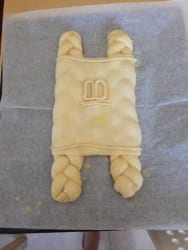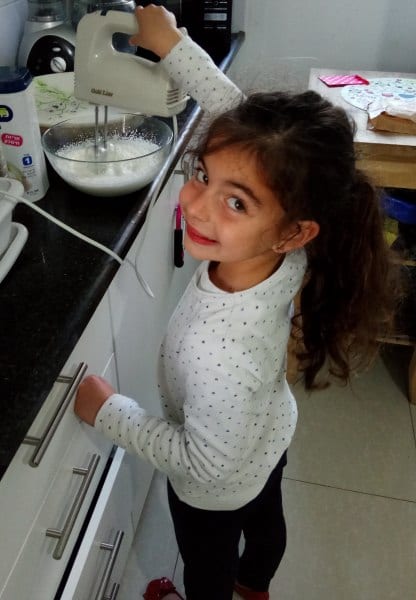By Tessy Agassi

Cheese Blintz shaped like a Torah Scroll
This week we celebrated Shavuot, my personal favorite holiday of the Jewish year. While the Bible references this holiday as the Festival of First Fruits, on this holiday we also commemorate receiving the Ten Commandments at Mount Sinai. In fact, since our exile from the Land of Israel nearly 2,000 years ago and our separation from the Biblical harvests, this aspect of the holiday has become its central theme. Revelation at Mt. Sinai was a great milestone for us as a nation because it is at that moment in time that a group of individuals, descended from one man, Israel, who have just escaped from Egypt, become a people. On that day, the Jews united and began their journey as a nation. Just thinking about all of this, I feel proud that we have preserved that unity and continue to follow the teachings of the Torah.
But back to Shavuot. From a very young age, we are told the stories of that amazing day at Sinai, both from the Bible and from the traditions of our sages as recorded in the Midrash. Those traditions include beautiful descriptions of what Mt. Sinai looked like, each story encompassing a lasting message that we take with us from childhood to adulthood. According to our tradition, Sinai was a low, ordinary mountain – neither tall nor majestic in appearance. But it was the mountain chosen by G-d to receive His word because of its modest proportions and ordinary appearance. A message that would resonate to all regarding the attributes that G-d values – not majesty nor arrogance but simplicity and modesty.
And when the Jewish people stood around the mountain in fear and anticipation, Mount Sinai suddenly bloomed and was covered in flowers and plants, expressing its own excitement in the role it had been given to serve G-d. In honor of that beautiful story, a wonderful custom of this holiday is to decorate our homes and synagogues with flowers and plants. And it is a beautiful way to welcome the holiday indeed! My children made handmade paper flowers and then ran outside to pick fresh ones from our backyard. Together we placed them on the dining-room table to ensure a festive atmosphere. Surrounding oneself with all this beauty is really all you need, but it is only the beginning of what was going to be a great Shavuot.
The next great custom is to prepare foods loaded with dairy products. There are many explanations for this custom but I will share just one. There is a lovely verse in the Song of Solomon (4:11) “honey and milk are under thy tongue.” This unusual book of the Bible is interpreted by Jews as an allegory regarding our relationship with G-d, either the relationship between the individual and his creator or between the People of Israel and her G-d. This verse is then interpreted as referring to the Torah, which is like honey and milk in our mouths. Just as a baby gets all of his nutrition from his mother’s milk, we fulfill our spiritual needs through the Torah and our faith. So as we eat milk products, we remember our joy in receiving the Torah from G-d. But of course, we don’t just drink milk. We prepare amazing quiches, puddings, cheese filled pastries, both savory and sweet, and of course cheese cake. It is a dairy fest!

My daughter helps with the baking
Those of you who have visited Israel know what amazing fresh produce and delicious milk products we have here. So you can imagine the rich and tasty meal we shared with our friends and family. To those of you who haven’t been here yet, I hope this will convince you to visit us as soon as possible!
Reaching the best part of the holiday, it is a custom to stay up all night and study the Bible. It might not sound as appealing as the previous customs but I can assure you it is the most beautiful and meaningful of them all.
I can only offer you a glimpse of this wonderful tradition by sharing with you what we did in my house in Samaria. We always start with the children. They invite their friends to the house and then they choose a favorite Bible story. We sit together, reading the story from the Bible and my husband and I ask them questions, encouraging the children to participate and take an active part in the learning process. They all had an amazing time and we were happy to send them off to sleep.
Now my husband and I could start our “Chevruta” (a study duo). This year we decided to study some of the commentaries and gain a better understanding of the verse “Love thy neighbor as thyself” (Deuteronomy 19:18). Together we shared our thoughts and discussed the many aspects of this very important teaching.
At this point, I must confess: As much as I love Shavuot and the idea of learning all night, it has been many years since I actually stayed up all night. Nevertheless I start the Bible study each year with every intention of succeeding. I’m sorry to say though that this year was no different than the previous ones. Sometime shortly after midnight, I went to bed, but my husband stayed up all night studying Bible and I like to think that I had a part in that.
The rest of the holiday was a wonderful combination of prayer services, gatherings of family and friends and great food!
I feel like Shavuot is the essence of everything, starting with the receiving of the Torah, that unimaginable defining moment of our history. And as we revel in the “milk and honey” and wonderful “first fruits” of this wonderful land and celebrate the wheat harvest, we are truly connecting to everything that is Biblical Israel – the people, the land and the G-d of Israel.
